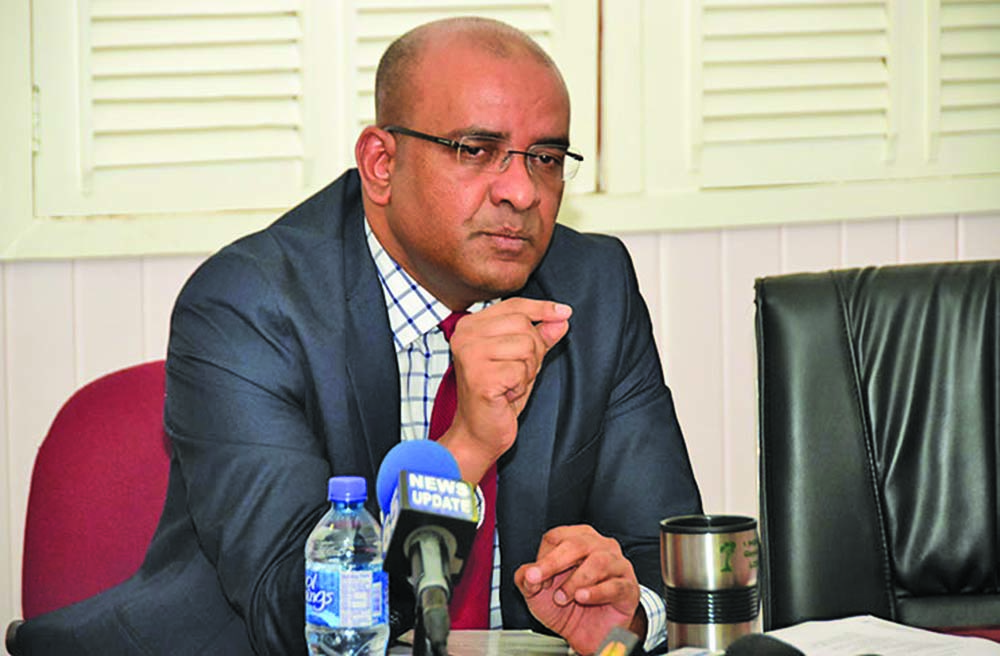Opposition Leader Bharrat Jagdeo
Feb 23 2018 Source
Guyana/Venezuela controversy
…calls on Govt to be more open, honest with citizens on key developments
The threat to Guyana’s territorial sovereignty from its neighbour, Venezuela is very real and Opposition Leader Bharrat Jagdeo on Thursday called on the David Granger Administration to demonstrate more openness, honesty and transparency when divulging information to the citizenry about key developments related to the Guyana/Venezuela border controversy.
Jadgeo, still to date Guyana’s longest serving former Head of State and President, told reporters on Thursday that he has received very credible information from a source which justifies his position.He said he strongly feels that Government is also aware of this potential treat and is urging the Administration to keep Guyanese abreast with these developments.
“The last time I pointed out the need to balance out confidentiality with the need to keep the public informed. As a former President of Guyana I am always conscious of that balance,” he said.However, Jagdeo reiterated that there has been an enhanced threat at the borders and the Government has not been forthcoming on the issue, even though they have information about it.“Somehow many people misinterpreted what I said to mean that I was talking about the gangs and I was speaking about an enhanced threat from the state of Venezuela,” he explained.The former Commander-in-Chief of the Armed Forces continued, “And whilst we have to ensure that our communities are protected from gangs, I think the Government has available all the analysis.“I don’t want to speak about it, but I have received some of the information from other sources that lead me to believe that there is a real enhanced to our nation and its sovereignty.”Jagdeo said the matter should not just be discussed among Cabinet member and the Government should threat this matter as one that “belongs to them.”Rather, he said that if Guyana is to suffer from an act of aggression then it will be the people of the country not just the military, even though in his opinion, the military is not strong enough.
President David Granger recently visited villages in Region One (Barima-Waini) that are bordered by Venezuela, where 24-hour security posts were established by the Guyana Defence Force (GDF).During his visit to Kaikan, which the President described as a “frontline” village, he said “I have come here with a promise to ensure that Kaikan is fully integrated into Guyana.
Have no fear, if we are united, we will prevail. We will be able to live in a strong, secure and stable country… Frontier communities are guardians of Guyana’s territorial integrity and national security. They are our first line of defence against any attempt at incursions and invasions.”The President, according to a release from the Department of Public Information, told the villagers that while the Army and the Police will intensify their efforts to ensure their safety, they have a significant role to play as they are the eyes and ears on the ground.
“In weeks and months to come, I am asking you to join the People’s Militia, we are not making war with anyone but I want you to be prepared… My brothers and sisters, we have to protect ourselves… People bring illegal guns into the country and they commit crimes with those illegal guns, unregistered guns. These crimes make us feel very unsafe… We can’t only rely on the Police; we have to look after our own families, our own communities,” the President said. Prior to this meeting, the President met with villagers of Whitewater which is also bordering Venezuela and made similar sentiments. Whitewater is also benefiting from 24-hour security from the GDF. The Guyana/Venezuela border controversy was recently referred to the International Court of Justice (ICJ) by the United Nations after relations between the two countries reached an all-time low when US oil giant ExxonMobil discovered oil on Guyana’s shores.
Venezuela, which is going through a political and economic crisis, is laying claim to the County of Essequibo that covers about two-thirds of Guyana’s territory and the waters off its coast.

